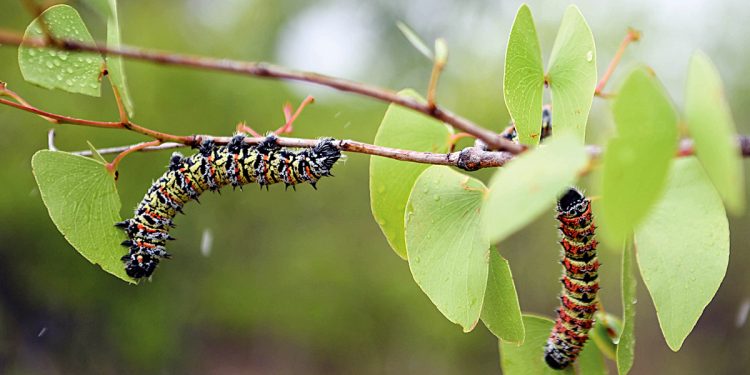Phane harvesters secure ‘lucrative’ market
Image – Patriot on Sunday
Mophane worm (phane) harvesters in the Bobirwa region will, as of April, sell their harvest at multi-purpose corperative society facilities in the area in a move intended to protect them from unscrupulous buyers.
The move, it is said, is aimed at protecting the harvesters from obvious and rampant exploitation by the buyers who oftentimes target those desperate to raise money for pressing daily needs such as buying groceries or school uniform for their children.
Complaints arose during a Tsetsebjwe kgotla meeting addressed by Bobonong Member of Parliament Mr Taolo Lucas on Monday and reverberated further in Moletemane, with harvesters crying foul that price at which buyers sought to acquire phane did not match the labour input.
Also, harvesters argued that the risks involved in harvesting the worm called for a better price.
It was reported that buyers wanted to acquire the harvests at P150 per stanluku (a metric for phane said to be an equivalent of 12.5 kilogram bag of mealie meal) while the harvesters felt P400 would be a fair price since the former then resell at P600 or more.
Realising the desperation, buyers reportedly pounce on those whose financial positions deter them from waiting any longer.
Buyers, it is reported, would sneak into the yards of the desperate sellers under the cover of darkness and flash cash before their faces as a temptation to nudge them into selling at between P100 and P150 per 12.5 kg bag.
Selling at same price per stanluku, it is said, will thwart chances of some selling their harvests for a song while others watch helplessly as their harvests rot in houses after buyers reject them for what they deem exorbitant fees.
Pressed to reveal the plans on helping protect harvesters from falling victim to buyers ready to make an easy killing, an officer from the office of district commissioner, Ms Sekgabisiwa Keitumetse revealed that the sub-district’s technical advisory committee and SPEDU had struck an agreement with Department of Cooperatives to have phane harvests sold at multi-purpose cooperative society shops.
Although the details of the arrangement are yet to be finalised, Ms Keitumetse called on the harvesters to protect themselves from being exploited. She suggested that they could find a buyer and gather at a village kgotla where they would sell at a price determined by themselves.
Another of the solutions would be for the harvesters to form cooperatives which would then have other finance generating activities going on pre and post phane seasons.
With cooperative societies, the harvesters will have a market place for their harvests, an officer from the department of forestry and range resources Ms Motlabaseyo Moeng said.
“Phane is a diamond that can uplift your lives,” said Ms Moeng who added that the complaints about low prices for phane reverberated all corners of the country where the worm is found.
“With cooperatives, you can get a loan to buy school uniform and other necessities while awaiting the right price for your harvests,” she said while advancing a cause for cooperatives.
When one side of the harvesters complained bitterly about the prices, another side complained about maltreatment at the hands of forestry officers.
In Tsetsebjwe, some harvesters alleged that officers would pounce on them at the forest and destroy their harvests.
However, it was clarified that such harvesters did not acquire the permit that allowed them to harvest over 40kgs of phane.
Harvesters, reportedly, claim personal consumption when going into the forest, but would then exceed the set 40kg or less weight, electing to harvest as if they paid the P110 fee for the acquisition of a dealer’s permit.
Again, harvesters complained about the P2 500 export permit required in order for them to sell their harvests in South Africa especially. They suggested that the amount be slashed so as to allow them to sell profitably.
(BOPA)



